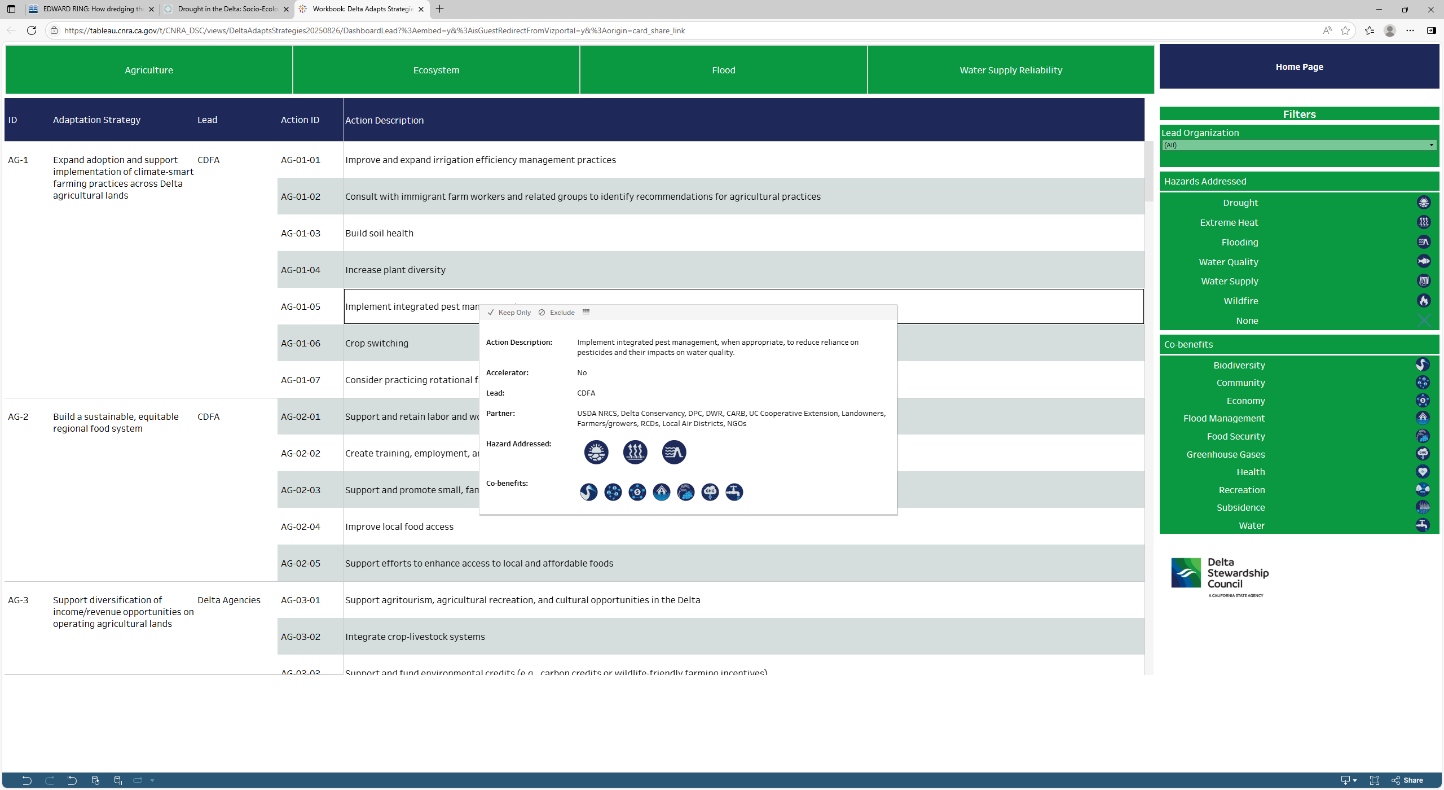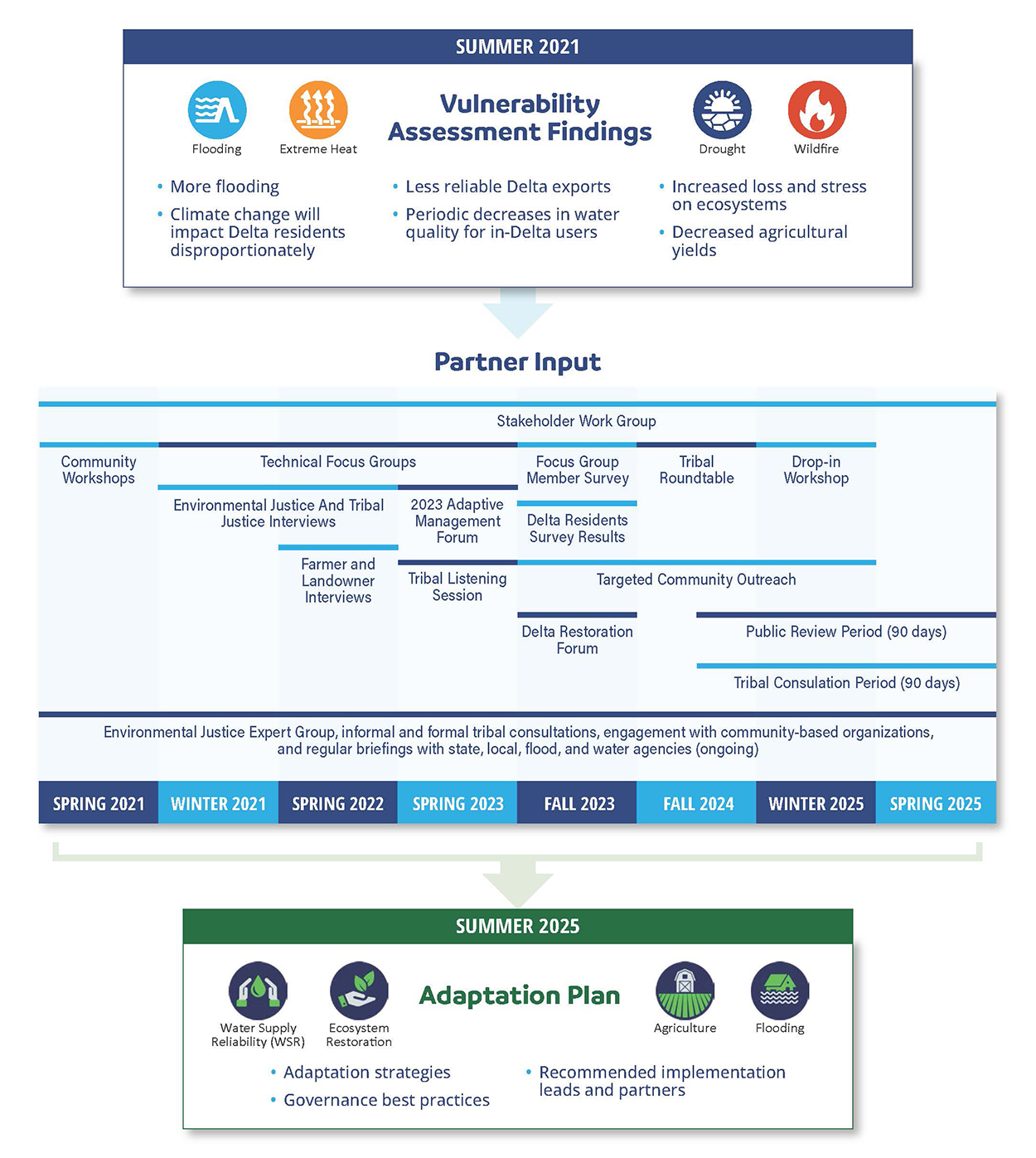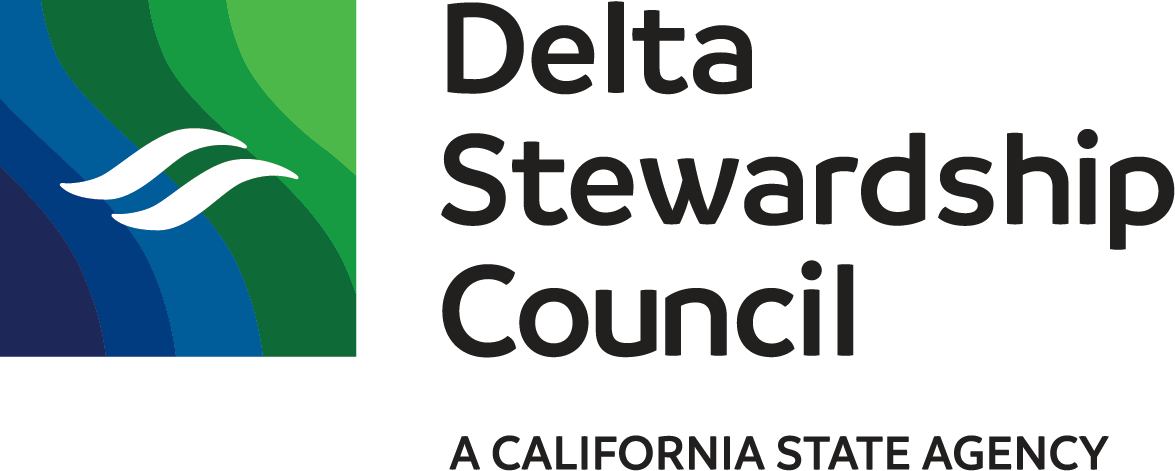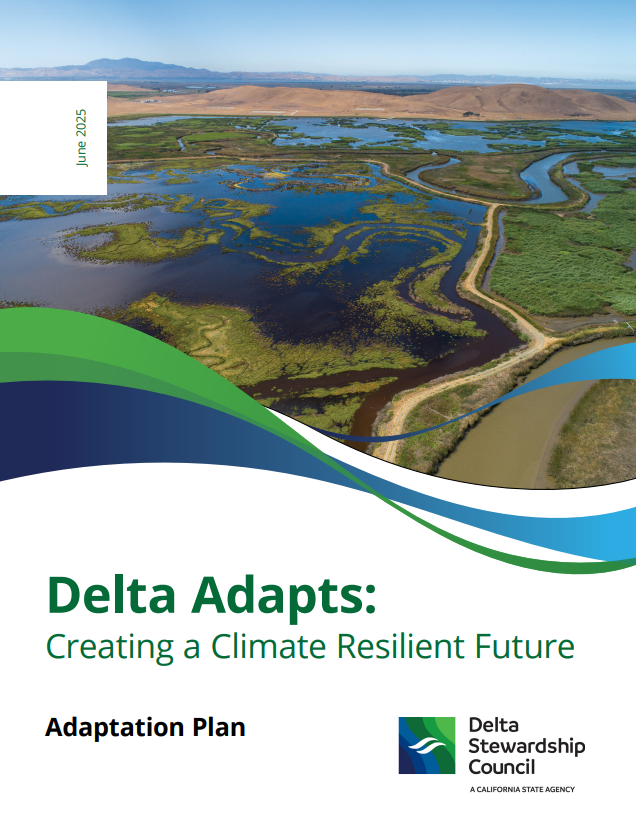Delta Adapts: Creating a Climate Resilient Future
Background
Climate change poses growing risks to California's water supply, ecosystem, wildlife, communities, economy, and more. In the Sacramento-San Joaquin Delta, it threatens water quality, stresses native species, and increases the strain on levees that protect residents, farmland, and public utilities from flooding. To reduce the Delta’s vulnerability, the region urgently needs science-based adaptation strategies and decisions.
A Two-Part Initiative
Since 2018, the Delta Stewardship Council has led a two-part climate initiative called “Delta Adapts,” which takes a comprehensive, regional approach to climate resiliency that cuts across regional boundaries and commits to collaboration across state, local, and regional levels. The initiative began with a climate change Vulnerability Assessment for the Delta and Suisun Marsh, published in June 2021. Explore our interactive storymap for an in-depth summary of the Delta Adapts Vulnerability Assessment and Adaptation Plan, plus next steps.
The Council is collecting input about a new work group to support implementation of the Delta Adapts Adaptation Plan and identify resources to build community adaptation capacity. Please complete this survey if you are interested in learning more about, being involved with, or giving feedback to help shape a Delta Adaptation Work Group. The work group’s first meeting is being planned for 2026.
Part One: The Vulnerability Assessment
The initiative began with a climate change Vulnerability Assessment for the Delta and Suisun Marsh, published in June 2021. For an overview, read our information sheet: About the Vulnerability Assessment.
Part Two: The Adaptation Plan
In June 2025, the Council adopted the Adaptation Plan, which, along with supporting documentation, details strategies and actions the Council and its partners can take to adapt to climate change in the Delta. (Lea el resumen ejecutivo en Español.) For an overview, read our information sheet: About the Adaptation Plan.
Adaptation Strategy Dashboard
The Council created an Adaptation Strategy Dashboard for partners and the public to sort and view Adaptation Plan strategies and actions.
Click the drop-downs below for Dashboard 1) navigation instructions, 2) definitions, and 3) acronyms and abbreviations.
Adaptation strategies in the Dashboard are organized by recommended leads and partners identified in the Adaptation Plan. For recommended adaptation strategy implementation leads or partners interested in viewing strategies your institution is associated with, first navigate to the Home Page and select either the “Lead” or “Partner” button. Then, in the table view, filter by your organization name (e.g., DWR) or type of organization (e.g., Water Suppliers) using the drop-down located in the top right-hand corner. If you would like to see a full list of all strategies, select either the Lead or Partner button and do not filter by organization.
Strategies can be further filtered by focus area (agriculture, ecosystem, flood, or water supply reliability) at the top of the page and by hazards addressed, co-benefits, and “adaptation accelerators” on the right-hand side of the page. To reset filtering, select the same icon again from the focus area, hazards addressed, or co-benefits lists and return lead, partner, or adaptation accelerator drop-down lists back to “(All)”.
Hover your cursor over the “Action Description” column header in the main table for more information on the adaptation strategy and its implementing actions, including: a detailed description of the implementing action, whether or not the action is an adaptation accelerator, adaptation strategy recommended leads and partners, hazards the adaptation strategy addresses, and co-benefits associated with the adaptation strategy (see below).

For a complete set of definitions and acronyms used in the Dashboard, see the Acronyms and Abbreviations, Navigating the Strategies, and Glossary sections of the Adaptation Plan.
Implementing Action, or “Action”: An action that provides greater specificity than adaptation strategies and ranges from planning, coordination, research, project deployment, developing or accessing funding, and monitoring and evaluation.
Adaptation Accelerator, or “Accelerator”: An action identified by Delta Stewardship Council staff as one that should be taken first in the implementation of the Adaptation Plan, because: 1) these actions have a narrow window for implementation and 2) they have widespread support.
Lead: Entity proposed as the best positioned to convene, coordinate, and lead the implementation of a strategy.
Partner: Entity proposed to take a role in the collaborative implementation of a strategy.
Hazard Addressed: Climate hazard identified in the Delta Adapts Vulnerability Assessment that is addressed by a strategy.
Co-Benefit: Positive effect that results from achieving an adaptation strategy’s primary goal.
- BCDC - San Francisco Bay Conservation and Development Commission
- CalEPA - California Environmental Protection Agency
- CalOES - California Office of Emergency Services
- CalParks - California State Parks
- CARB - California Air Resources Board
- CDFA - California Department of Food and Agriculture
- CDFW - California Department of Fish and Wildlife
- CDPH - California Department of Public Health
- CEQA - California Environmental Quality Act
- CNRA - California Natural Resources Agency
- COGs/MPOs - Councils of Governments/Metropolitan Planning Organizations
- Council - Delta Stewardship Council
- CRS - Community Rating System
- CVFPB - Central Valley Flood Protection Board
- Delta Agencies - Council, DCP, Delta Conservancy
- Delta Conservancy - Sacramento-San Joaquin Delta Conservancy
- DLIS - Delta Levee Investment Strategy
- DOC - Department of Conservation
- DPC - Delta Protection Commission
- DPIIC - Delta Plan Interagency Implementation Committee
- DWR - California Department of Water Resources
- FEMA - Federal Emergency Management Agency
- FIRO - Forecast-Informed Reservoir Operations
- Flood-MAR - Flood Managed Aquifer Recharge
- GHAD - Geologic Hazard Abatement District
- HAB - Harmful Algal Bloom
- LCI - Governor's Office of Land Use and Climate Innovation
- Local FMAs - Local flood management agencies
- Local Governments - Delta Cities and Counties, including their offices and commissions
- NRCS - Natural Resources Conservation Service
- NGOs - Non-Governmental Organizations
- NMFS - National Marine Fisheries Service
- NOAA - National Oceanic and Atmospheric Administration
- NWS - National Weather Service
- RCCs - Regional Climate Collaboratives (Capitol Region and Bay Area)
- RCDs - Resource Conservation Districts
- RDs - Reclamation Districts
- SAFCA - Sacramento Area Flood Control Agency
- SLC - State Lands Commission
- SWRCB - State Water Resources Control Board
- UCANR - University of California Agriculture and Natural Resources
- UHI - Urban Heat Island
- US EPA - United States Environmental Protection Agency
- USACE - US Army Corps of Engineers
- USBR - United States Bureau of Reclamation
- USDA - United States Department of Agriculture
- USFWS - United States Fish and Wildlife Service
- USGS - United States Geological Survey
- Water Suppliers - California water suppliers in Delta export area
Adaptation Plan Process and Timeline
Developing the Adaptation Plan

The Adaptation Plan has been informed by a robust engagement process with diverse interests, findings from the Vulnerability Assessment, and other literature and existing adaptation plans (see graphic below or this information sheet for more details).

Past Accomplishments
Publishing the Vulnerability Assessment
The Council adopted the Delta Adapts Vulnerability Assessment in 2021. The Vulnerability Assessment evaluates the vulnerability of the Delta and Suisun Marsh to climate impacts through the end of the century. Refer to this handout for a summary of key vulnerabilities identified in the Vulnerability Assessment.
- Vulnerability Assessment and supporting appendices
- Flood Hazard Assessment Technical Memorandum
- Water Supply Technical Memorandum
- Ecosystem Technical Memorandum
- Equity Technical Memorandum
- Crop Yield and Agricultural Production Technical Memorandum
- Economic Impact and Exposure Analysis Technical Memorandum
- Outreach and Engagement Summary
- Planning Context for Climate Change in the Sacramento-San Joaquin Delta
As part of the Vulnerability Assessment, the Council created a custom social vulnerability index to identify areas within the Delta that are socially vulnerable to climate change impacts. See the Delta Social Vulnerability Index interactive map for more detail on the factors considered in the index or the identified areas.
The Council also created a flood explorer map which allows users to select various climate scenarios to visualize areas exposed to flooding.
Other resources include:
Background
- The Sacramento-San Joaquin Delta Reform Act, chaptered in 2009, mandates the consideration of “the future impact of climate change and sea level rise” (Wat. Code, § 85066.) in restoration planning and identifies a restoration timeline horizon of 2100. (Wat. Code, § 85302.) The Act also notes that the Delta Plan may address “the effects of climate change and sea level rise on the three State highways that cross the Delta.” (Wat. Code, § 85307.)
- Executive Order B-30-15, signed by Governor Brown in April 2015, requires State agencies to incorporate climate change into their planning and investment decisions. It also requires agencies’ planning and investment decisions to be guided by prioritizing natural infrastructure and protecting the most vulnerable populations.
- The Delta Plan is California’s roadmap for the region, supporting the coequal goals of a reliable statewide water supply and resilient Delta ecosystem. Research on climate change has advanced significantly since the Delta Plan’s adoption, with important implications for the Council as it seeks to fulfill its mission of furthering the coequal goals, which are sure to be continuously impacted by climate change.
As an agency of experienced planners, engineers, scientists, and communicators, the Council is uniquely equipped – and authorized – to steward the region toward resiliency. The Council has adopted regulations that support statewide water supply reliability and Delta ecosystem resiliency and has the resources needed to guide climate adaptation in the region. Through its strong working relationships with government agencies on the federal, State, regional, and local levels, the Council can influence action in the Delta to improve its resilience over time and communicate the statewide implications of anticipated regional impacts.
The Council’s role in Delta Adapts has three core elements:
- The convener bringing various partners together to work as part of a broader team,
- The initiator of the regional planning process, and
- An active participant collaborating with a robust group of experts and interested partners.
- Big Milestone for Delta Climate Adaptation Offers Exciting Pathways Forward - And It Needs Your Input by Morgan Chow, Dane Wicker, and Annika Ragsdale
- On the Way to a Multi-Benefit Climate Adaptation Strategy by Harriet Lai Ross
- Equity Through Adaptation by Avery Livengood
- Assessing Climate Change Vulnerabilities by Harriet Lai Ross
- Creating a Climate Resilient Future by Jessica R. Pearson



